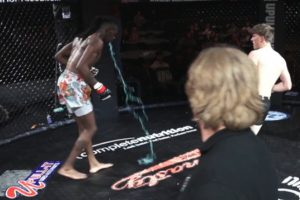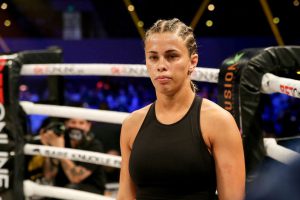https://www.youtube.com/embed/NzkP3CJywKk
I do get mail from time to to time and encourage my Blog readers to write me! Here is a recent example.
Hey Gary,
My name is Georgia, I work within the marketing team at Holland & Barrett here in the UK.
I’ve spotted you’ve been covering some really interesting topics in your judo blog and wanted to get in touch with an exclusive interview with two champion judo players that might be useful for Black Belt Magazine.
We sat down with the newly crowned 2022 Commonwealth Champion and Commonwealth Bronze medalist British Judoka, Emma Reid and Kelly Petersen-Pollard, for an exclusive interview. The pair revealed:
Their experiences of being female players in a male-dominated sportTips for making weight safely,How to encourage more girls to take up judoThe wider issue of retaining players once they start
Despite Kelly & Emma’s overwhelmingly positive experiences of being female judoka, currently only 24% registered BJA Judoka are women. With the spotlight currently on women in sport, we thought this was an opportune moment to reveal the exclusive interview to help inspire a generation of female judo players. Now is the time to shout about the unrivalled diversity and opportunities for representation that
the judo community boasts.
Please find additional images attached, with a transcript & video of the interview here – we’d love to see
if this would be of interest for your site?
Many thanks,
Georgia
—
Georgia Coward
georgiacoward@hollandandbarrett.com
Senior SEO Outreach Executive
Holland & Barrett International
Samuel Ryder House
Barling Way | Eliot Park
Nuneaton | CV10 7RH
England | UK
Research has shown that Olympic-level judoka generally start training early – around 6–7 years old. What age did you start and what drew you to the sport?
E: My mum and dad did judo at a university, so they took me & my sister down to their local club when I was about 5 or 6 so ever since then, I’ve been doing it at clubs and then finally came here to this dojo
K: Kind of the same, it was in my primary school. So, my mum and brother would go on the mat and would just sit on the side and then when I turned four, they were like *scoffs*“do you want to come on” and I was like *nervously* “Okay” and I’ve just stuck with it since
Early starters! So, do you think it would be possible to get into the sport as an adult?
E: Oh yeah
K: It’s for all ages. At my local club you have really little kids who are just starting off, but you also have older people who are beginners. You can start judo at any age, and you’ve even got the veterans tournament for over thirty.
E: Yeah, at my club there’s the little kiddies and then their parents watch and kind of are like “oh I’d actually like to go on with them” or they will [start coming to] the later sessions, so that brings them in. For competitive-level judo, I think people have started as teenagers and been just as successful.
What training do you do off the mat to support your judo?
E: We both do conditioning and weights. I tend to do more weights because I’m trying to bulk at the moment, so lean more heavily towards weights than conditioning, but we are all different. We have to pick what works for us and our programme really
K: A typical day will probably be technical, then weights or conditioning, and then a Randori (which is fighting). There is a lot of gym work off the mat. Most days there will be two training sessions. Randori will be two or three times a week, and then gym 3-4 times. Well, for Emma probably every day.
E: *laughs* yeah…
As with most sports, you have the added pressure of thinking about what you’ll do when you retire from competing. Do you have plans for after judo? I know both of you have completed your degrees recently; how did you manage to balance studying and training?
E: I went to Coventry University, and I trained a bit, but not as much as I do now, while I was doing my degree, and then when I finished, I came here. But then people have done it while they are training. I did event management and got a job with British Judo doing events so it’s sort of linked.
K: So, I don’t work, I am just concentrating on judo at the moment. I am doing a degree here [University of Wolverhampton] where I’ve actually just finished Exercise and Health, so I’m not really sure what I want to go into after, but I think I want to stay in sport – something along those lines. But yes, currently just training.
Up until the late 60s, women were restricted to softer forms of training and weren’t allowed to participate in randori (sparring). Things have obviously come a long way since then, but as a female judoka, do you feel that this shift closer to gender equality in sports is reflected in the wider landscape of judo?
K: The culture as a whole, has probably changed, in all sports, but I haven’t experienced a specific change in judo [since starting]. My old training partner was a boy, we trained together for years and there was nothing different about that.
We went to Japan together to train, you don’t think anything of it, he’s your training partner and that’s that. Male or female, it doesn’t matter. In our national centre, we are actually male and female and visually impaired, all in here at the same time so it’s really open to everyone. I don’t think there is any separation [now].
E: There was probably some tough girls back then that pushed it through, that said “no, I’m going to fight the men” and that has helped us now be pretty equal
Would you be paired up with a boy in the same weight category as you?
E: I’d go with maybe a lighter boy, a bit lighter than me – as they get older, the differences in strength become more noticeable. We get quite a few Scottish boys come up to train with us because they are younger and a bit lighter, so they are really good to train with.
Judo traditionally male dominated, as of 2020 only 28% registered BJA Judoka were female. How do you think we could encourage more women to take up the sport?
K: I think at club level, maybe in England, there are more men on the mat, I’m not sure if that’s reflected elsewhere. If you go abroad with judo, it’s very equal. There are a lot of women, and they have the same amount of weight categories.
E: Exposure to more diverse sporting events could inspire some younger people. If they don’t know what sport to go into, they might watch the judo and be like “wow, I want to do that” – well, hopefully. They do have all-girls classes or camp things to try and – I think some girls might be a bit nervous coming in, thinking they are going to have to fight boys – so having an all-girls camp may help. We sometimes do masterclasses where we go to clubs and try and inspire those younger people to stay in [judo]. I think a lot of people actually start judo when they are young, but then don’t stay on, so the issue is more retention & how to keep them in the sport.
K: I think also there are quite a few of us trying to post a lot more on Instagram and social media, and we are starting to get younger girls messaging us, which shows it’s slowly inspiring them. Through our social media you see both sides. You’ll see me, hair like this, sweaty and fighting on the mat, and then you’ll also see us dressing all ‘girly.’ I think maybe before maybe girls were a bit afraid like “oh god they’re all a bit manly” but through our social media you will see we’ve got both sides. That’s nice and that might bring more girls to get involved. Because we all get dressed up!
E: Yeah, I think they worry that they might start to look all muscly but when you are happy in your skin and posting it on Instagram then other people are saying “oh she’s happy like that”.
I suppose that feeds into the whole body positive social media movements – people are seeing and aspiring to achieve more diverse body types.
E: That’s one good thing with the weight categories: I’m in one of the heaviest weight categories, whereas Amy Plattern, another girl in the under 48 kg, is tiny and petite but we still do the same sport and the same thing, so it’s really open to everyone.
What is it like being a woman in judo?
K: I think women in judo are really accepted. I don’t think there is any difference.
E: It’s one of the best ones I think for sport where there’s not that much difference between male and female
K: Obviously, most women have a period so that’s a bit difficult when you come to weigh-in as you retain more water, don’t you?
E: Yep
K: So, you get a little bit heavier…
E: Water retention is the main thing, and then obviously your hormones. Some people want to eat more, and you keep the weight on. That’s probably the hardest part.
K: Also, when you are on your period it’s a little awkward when you’re in a white judogi *laughs* that always makes you feel a little more conscious… but yeah as a whole judo is not really divided in a way like that – it’s not harder if you are a female or male, it’s pretty much the same for everyone
E: Unfortunately, I don’t think there is much science at the moment really behind it. For me, I don’t really experience bad period pains so if I train, I don’t really notice. But then there are the small things like the difference in hormones, you can’t even notice but you might feel rubbish one day and it could be down to your cycle, but you wouldn’t even know. So hopefully the future, when there’s more research in it, then it’ll help our training.
There is a bit of a moment happening around women in sports, do you feel like you are part of something bigger?
E: I feel like as a whole, [the perception of] ‘women in sports’ is getting better – it’s kind of being appreciated more and publicised, things like that – but with judo, it’s such a community, it’s maybe sometimes harder to get it out there into the mainstream. But then that kind of our role as athletes, to try and promote it as much as we can to try and get more people into the sport.
K: I do think in judo there’s not that much like – so say in football it’s like everyone watches more male football, and then they watch female football not so much – in judo it’s pretty well split already…
E: Because we fight on the same days, and we would be on separate mats [next to each other], a female fight and a male fight. So, people are not forced to watch it but it’s harder to differentiate between male and female judo. It’s the same rules, same times, there are no disadvantages or advantages for boys vs. girls.
Do you have any advice for forming healthy habits – healthy ways to lose weight, forming routines…
K: It is all about balance. You get these extreme weight cuts or these fads of ‘eat this for so long and you’ll lose weight’ but if you just aim for balance throughout, for example: eating well but if you do fancy something a little bit ‘unhealthy’ then that’s alright – just have one of those things and you’ll be fine. If you restrict yourself, you go crazy.
It’s about all the little 1 percent as well so:
Sleep: make sure you’re getting a good night’s sleep every night. Water: make sure you are always drinking enough water, staying hydrated. Eating well. All that leads to a much happier person –healthier and happier!
E: And give yourself enough time. We’ve got to ‘make weight’ every so often, so giving yourself enough time to make it well rather than rushing and using bad techniques is really important.
Top three wellbeing tips:
E: Hydration is key. I don’t have an aim for how much I want to drink but I constantly have a bottle with me so I’m not like ‘oh god I haven’t drunk in an hour or so’, and I always go for coffee – stay hydrated in that way as well… but yes, hydration, especially when it’s hot and you’re on a session you’ve got to make sure. There’s the extra stuff like the hydration tablets, because you forget how much other stuff comes out with the sweat and stuff so getting that back in.
K: Sleep & rest is as important especially for us as full-time athletes. After session most of the time we will be relaxing somewhere, or just go home most of the time to fully relax, calm down and recharge.
E: Even if you train from 9-1 and it’s not a full day, you often think ‘oh I’ve got the afternoon off’ I sometimes get tempted to squeeze in seeing a friend or going to do something when really, I should be relaxing because that’s part of being a full-time athlete.
K: And number three…
E: Be happy!
K: I was going to say that!
Together: Enjoy the ride.
K: Take it all in and enjoy it.
E: You get bogged down sometimes in making weight or being away from home and sometimes you’ve got to be like ‘I’m by a pool in Spain, just enjoy it.
If you could only eat one thing for the rest of your life?
E: Potatoes.
K: Potatoes?
E: You can have chips, you can have mashed potatoes, they are versatile. Or chicken.
K: Chicken? What about a meal?
E: Ok, the smart answer would be a balanced one. My answer is lasagne.
K: My meal would be carvery. Roast dinner. If you could only have one thing? Chocolate? Chocolate. Has to be. Yep, chocolate. Or coffee! Right, we’ve got a whole list now.
Updates:
Celebrating its 10th year anniversary!
Gary Goltz Judo Seminar for Black Belt Magazine
Gary Goltz USJA Coaching Video
This video is presented by 8th degree black belt and former USJA president Gary Goltz. This is a fantastic video that covers all aspects of teaching coaching…
September – 2022
3rd to 5th Saturday to Monday – Nanka Shorai Camp with Darcel Yandzi, Baldwin Park, CA11th Sunday – 1st Annual North American Judo Championships, Wayne, NJ11th Sunday – Nanka Fall Tournament, Westminster, CA 17th Saturday – Becerra Judo Challenge, Plano, TX18th Sunday – Nevada State Kosen Judo Championship, Las Vegas, NV
24th Saturday – Referee Clinic Tijuana, Mexico
October – 2022
1st Saturday – Goltz Judo Dr. Z Memorial Scrimmage, Claremont, CA9th Sunday – Nanka’s Team Tournament, Westminster, CA27th Thursday & 28th Friday – Nanka’s Hand-On Police Judo Workshop, Santa Clarita29th Saturday – Shoshinkan Tournament, Las Vegas
I’m always looking for new subjects to write about regarding judo as well as contributions from my readers. Please send them to gary@garygoltz.com, thanks.
Judo blog, Judo interview, Judo
Black Belt Magazine
Bitcoin
Ethereum
Monero

Donate Bitcoin to The Bitstream
Scan the QR code or copy the address below into your wallet to send some Bitcoin to The Bitstream

Donate Ethereum to The Bitstream
Scan the QR code or copy the address below into your wallet to send some Ethereum to The Bitstream

Donate Monero to The Bitstream
Scan the QR code or copy the address below into your wallet to send some Monero to The Bitstream
Donate Via Wallets
Select a wallet to accept donation in ETH BNB BUSD etc..












